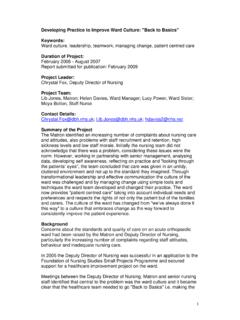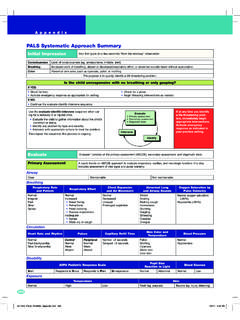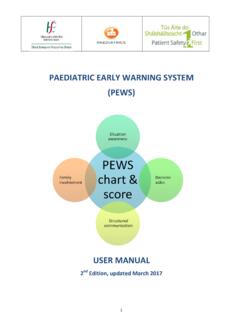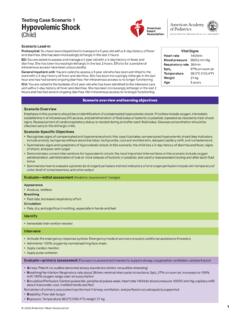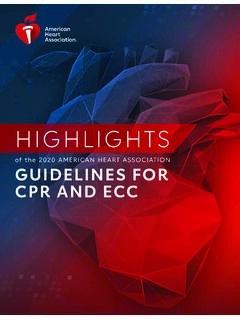Transcription of Pediatric Advanced Life Support - PALS
1 CMEs Training Presents Pediatric Advanced life Support - pals Pre-Course Study Guide 2015 Guidelines FBON: 50-12259 CMEs Training 11369 Okeechobee Blv. Ste. 300, Royal Palm Beach, FL. 33411 Page 2 CMEs Training Table of contents: Content: Page: Welcome pages 3-4 General information 5 Sample Agenda 6 What is pals 7- 8 Pediatric ABCD 9-10 Airway skills 11-14 Electrical therapy 15 Vascular access 16-20 pals medications 21-23 pals scenarios 24-30 ECG review 31-38 pals algorithms 39-42 pals math 43-45 CMEs Training 11369 Okeechobee Blv. Ste. 300, Royal Palm Beach, FL. 33411 Page 3 CMEs Training This packet is intended for use as a supplement PRIOR to attending an Pediatric Advanced Cardiac life Support Course.
2 Welcome to CMEs Training pre-course study packet. Critical Medical Education & Training, Inc., (CMEs Training), is committed to improving the quality of healthcare by providing new skills and knowledge as it becomes available through continuing education. Whatever your goal whether it be career enhancement, personal or re-licensure, CMEs Training will provide continuing education to the disciplines it supports through Professionalism, Respect, Integrity, Dependability and Evaluation, (PRIDE). CMEs Training recognizes that balancing home and career can be difficult so we have developed learning opportunities that are flexible and present themselves not only in the traditional classroom setting but as a convenient alternative, via on-line programs.
3 Additionally, we can customize any curriculum to fit the needs of your company and bring it to you! Critical Medical Education & Training Incorporated is a state-of-the-art educational and training institution committed to providing the highest level of instruction available for a wide variety of medical disciplines. CMEs Training offers on-line classes and satellite facilities in the following cities: Tampa, Jacksonville, Orlando, Washington DC, Maryland, Ohio, Virginia with additional sites being added in 2017. In addition to the above facilities CMEs Training will provide instruction at medical institutions, fire training facilities and private businesses. CMEs Training is approved by the American Heart Association, Florida Board of Nursing and Florida Department of Emergency Medicine to offer a wide variety of courses to fit almost any medical educational need.
4 CMEs Training 11369 Okeechobee Blv. Ste. 300, Royal Palm Beach, FL. 33411 Page 4 CMEs Training instructors come to us with very diversified backgrounds within the medical and fire rescue community and have extensive experience educating medical professionals from a variety of disciplines. All are fully licensed and American Heart Association compliant, have attained a high level of respect professionally, many with twenty to over thirty years of experience in their respective disciplines and have received professional recognition and awards prior to becoming instructors at CMEs Training. The AHA has set the GOLD STANDARDS FOR RESUSCITATION GUIDELINES AND continues to lead the field in Emergency Cardiac RESUSCITATION for all medical professionals.
5 The AHA recognizes only those institutions that can provide the required initial and recertification courses as mandated by the AHA. CMEs Training provides these Gold Standards of Resuscitation guideline courses in a format that is stress-free, flexible to the needs of the student and with the latest power point and visual teaching aids. CEUs are no longer available for recertification of BLS, ACLS or pals . Thank you for choosing CMEs Training for your educational needs. NOW LET S GET STARTED! CMEs Training 11369 Okeechobee Blv. Ste. 300, Royal Palm Beach, FL. 33411 Page 5 CMEs Training pals Study Guide Pre Course Study Material for you to review Guidelines have recently changed and certain American Heart Association (AHA) textbooks, materials and handbooks are available now at our bookstore.
6 Please check with your educator to library AHA textbooks or order materials by calling Channing Bete at 1-800-611-6083 or visit or Laerdal Medical at 877-523-7325 or THE 2015 PRE-COURSE EXAM IS LOCATED ON-LINE AT Enter Pass Code: pals15 AHA requires a minimum score of 70% At the end of this course you must be able to demonstrate treatment of the following objectives during a simulated VF (Ventricular Fibrillation), VT (Ventricular Tachycardia) and PEA (Pulseless Electrical Activity) cardiac, respiratory, or shock arrest scenario: Key changes in Pediatric Advanced life Support , reflecting the new science from the 2010 American Heart Association Guidelines for Cardiopulmonary Resuscitation and Emergency Cardiovascular Care: 1- and 2-rescuer child CPR and AED use 1- and 2-rescuer infant CPR Management of respiratory emergencies Rhythm disturbances and electrical therapy Vascular access Resuscitation team concept Cardiac, respiratory and shock case discussions and simulations systematic approach to Pediatric Assessment What happens if I do not do well in this course?
7 The Course Director or Lead Instructor will remediate (tutor) you and upon remediation you will be permitted to continue with the course. Any questions please contact our office at: 877-850-2702 or 772-345-7522 or online at CMEs Training 11369 Okeechobee Blv. Ste. 300, Royal Palm Beach, FL. 33411 Page 6 pals Sample Initial Course Agenda Approximately 14 hours Day 1: Registration Welcome; introduction Video introduction: o pals Course Overview o Overview of pals Science Practical sessions o Respiratory Emergencies o BLS and competency testing Practical sessions o Rhythm Disturbances/Electrical Therapy o Vascular access Lunch Resuscitation Team Concept Overview of Pediatric Assessment Overview of Learning Stations Practical sessions o Respiratory Cases 1 and 2 o Respiratory Cases 3 and 4 o Shock Cases 5 and 6 Day 2.
8 Q & A Practical station o Shock Cases 7 and 8 o Cardiac Cases 9 and 10 o Cardiac Cases 11 and 12 Putting it all together Lunch Course Summary and Testing Details Written evaluations (testing) pals Core Case Testing Course evaluation/remediation Distribution of cards CMEs Training 11369 Okeechobee Blv. Ste. 300, Royal Palm Beach, FL. 33411 Page 7 CMEs Training What is pals ? This classroom, video-based, Instructor-led course uses a series of simulated Pediatric emergencies to reinforce the important concepts of a systematic approach to Pediatric assessment, basic life Support , pals treatment algorithms, effective resuscitation and team dynamics. The goal of the pals Course is to improve the quality of care provided to seriously ill or injured children, resulting in improved outcomes The pals Course is for healthcare providers who respond to emergencies in infants and children.
9 These include personnel in emergency response, emergency medicine, intensive care and critical care units such as physicians, nurses, paramedics and others who need a pals course completion card for job or other requirements. During the course you will actively participate in a series of simulated core cases. These simulations are designed to reinforce important concepts, including: Identification and treatment of problems that place the child at risk for cardiac arrest Application of a systematic approach to Pediatric assessment (next page) Use of the evaluate-identify-intervene sequence (next page) Use of pals algorithms and flow charts Demonstration of effective resuscitation team dynamics For the purposes of these guidelines Infant BLS guidelines apply to infants<approximately 1 year of age.
10 Child BLS guidelines apply to children approximately 1 year of age until puberty. For teaching purposes puberty is defined as breast development in females and the presence of axillary hair in males. CMEs Training 11369 Okeechobee Blv. Ste. 300, Royal Palm Beach, FL. 33411 Page 8 Start CPR (C-A-B) pals systematic approach Algorithm Yes No Yes Yes No If you identify cardiac arrest Initial Impression (consciousness, breathing, color) Is child unresponsive with no breathing or only gasping? Shout for help/Activate Emergency Response (as appropriate for setting) Is there a pulse? Open airway and begin ventilation and oxygen is available Is the pulse <60/min with poor perfusion despite oxygenation and ventilation?

